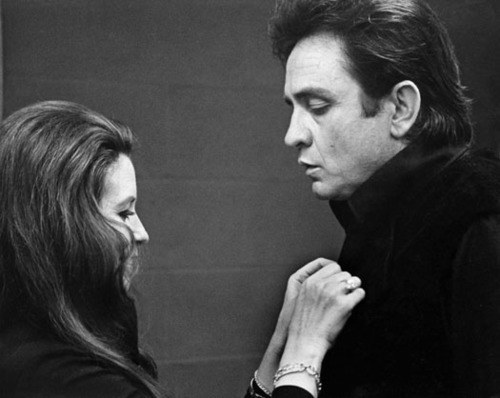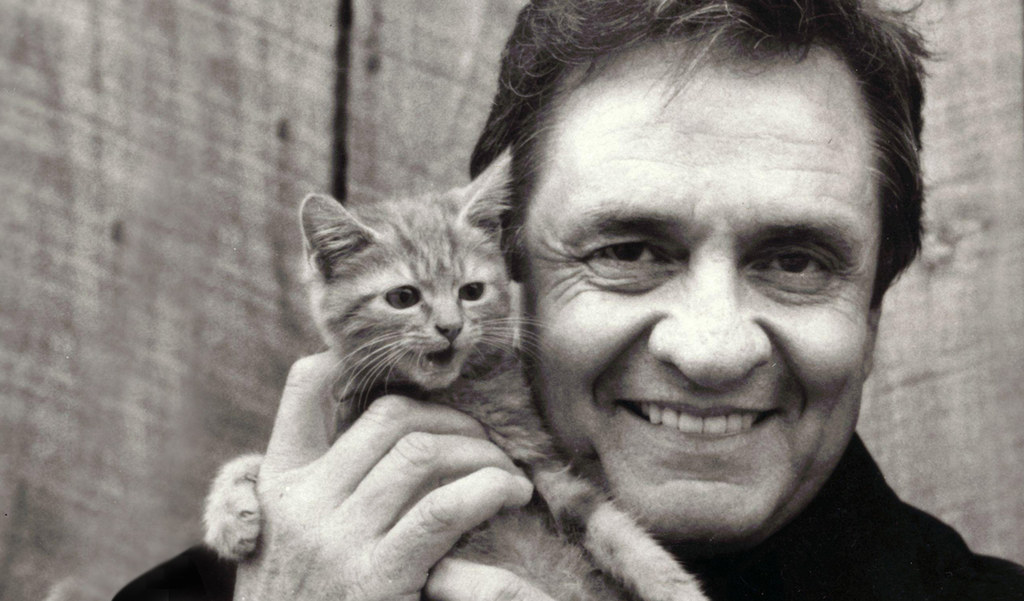Cry, Cry, Cry
Written in June of 1955, this was the first successful hit for Johnny Cash. It was written overnight after bringing other songs to Sun Records. Sam Phillips, the owner, told Johnny to bring a song he would be able to sell. With a catchy tune, it speaks of disappointment, and a lost love that seemed not to be worth waiting for.
I Walk The Line
"Because you're mine, I Walk the Line". A song about love, limits and devotion. It was released in 1958, and recorded (and several times performed) with Marshall Grant and Luther Perkins. Johnny wrote it in 1956, and intended it to be a slow ballad, until Sam Phillips convinced him to try a faster arrangement. While on a TV interview, Johnny was asked why did he always hummed while singing this song. His reply was simply, "To get my pitch". This song is particularly complex when it comes to key changes, and the voice needed time to adjust.

Long Black Veil
Long Black Veil was written in 1959 by Marijohn Wilkin and Danny Dill. A classic country tune, it was originally recorded by Lefty Frizell.
Johnny Cash first performed it on The Johnny Cash Show in 1969, in a duet with Joni Mitchell. Eventually he recorded it in album as well. This song, turned into a landmark through Cash's deep, cavernous voice. telling the story of a man falsely accused of murder. The man (we listen to his point of view), refuses to give an alibi for the night of the murder, since he was "in the arms of my best friend's wife". He prefers to be sentenced to death and eventually die, instead of revealing the truth. The woman mourns him and visits his gravesite, wearing a long black veil.
Folsom Prison Blues
At the same time a voice of protest and a trait of the outlaw soul that lived in Johnny Cash, Folsom Prison Blues was written and recorded in 1955. Johnny was inspired by a movie he saw while serving in the United States Air Force in West Germany, called "Inside the Walls of Folsom Prison". It brings that classic element of a prison song with a train song - icons of the country folk genre. It seems to combine the speed of a moving train, intertwined with a reflexion of what makes a man kill another one. Being in a prison combines a sense of lost of freedom and some sorrow, emphasizing the blues that won't get away while he is stuck at Folsom. Johnny stated that "I shot a man in Reno, just to watch him die", seemed to be the worst reason possible to kill someone, and that is why he used this line.
Hurt

Ring of Fire
Ring of Fire was written by June Carter and Merle Kilgore, being recorded and released by Johnny Cash in 1963. Some controversy surrounds this song. However it is considered (I do consider it) a love song. Of a burning, consuming, overwhelming passion and love. In the same way it can destroy you or lift you up and improve you. Powerful words brought to a deeper, more intense level by Johnny's voice, especially when you know it was written by June Carter. Johnny and June are the epitome of this song and its message.
Rusty Cage
Chris Cornell wrote this song for Soundgarden in 1991. Johnny Cash recorded it for "Unchained" in 1996. Another song that is iconic in both its versions. Johnny seems to make it his own again, with the typical country fast paced arrangement and giving life to the lyrics. The song provides elements of freedom and faith.
You Are My Sunshine
This is one of the most popular and covered songs in the world. Originally recorded by Jimmie Davis and Charles Mitchell, in 1939, this song is about love. Not necessarily a romantic love, since it has been used in a various amount of contexts - even as a children's lullaby. Johnny Cash's growling voice is perfect for it, bringing the country roots of it back to life.
Cocaine Blues
Johnny Cash was both a sinner and a saint. He redeemed himself, and found in himself a mission of never forgetting what he had done and seen. He has a famous quote that starts with "You build on failure...", and this statement has his essence.
Cocaine Blues declares his sympathies towards the men and women inside prison walls. The song was written by T. J. "Red" Arnall in the 40s.
Johnny Cash performed the song at his Folsom Prison concert, in 1968, saying "Folsom" instead of "San Quentin" and adding the provocative and feisty lyric "I can't forget the day I shot that bad bitch down." During the performance, Johnny coughs several times. This is noticeable in the recording and he even says that singing the song nearly did his voice in.
Man in Black
While performing it live, Johnny stated on several occasions that this song was deeply personal. It gave him his most famous name, it stated his identity. It is indeed a protest song, written and recorded by Cash, released in 1971. He is the Man in Black both for his aesthetic preferences as well as for his sound, raspy and dark. The lyrics explore Cash's protest against racism, the treatment of the poorer of society by the powerful and wealthy, the condemnation of drug users and prisoners, and the war in Vietnam.
Johnny assumes a position of a rebel against the norm. And that is why he keeps appealing old and new, white and black, from every corner of the world.

